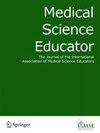Exploring Medical Student Trust in Generative Artificial Intelligence (ChatGPT) Versus Peers in Team-Based Learning.
IF 1.8
Q2 EDUCATION, SCIENTIFIC DISCIPLINES
Medical Science Educator
Pub Date : 2025-01-24
eCollection Date: 2025-04-01
DOI:10.1007/s40670-025-02289-9
引用次数: 0
Abstract
This study explored the impact of artificial intelligence (AI)-generated responses from ChatGPT on medical students' decision-making and the effectiveness of group discussions in correcting AI-induced misconceptions. Forty students responded to clinical cases in three phases: independently, after reviewing AI answers, and post-group discussions. Students' responses demonstrated a significant shift to match those provided by ChatGPT, whether or not these were correct. Group discussions did not correct misinformation from AI. The findings not only highlight the potential of AI to influence medical students' decision-making but also emphasize the need for critical assessment and guidance around responsible use of AI in medical education.
探索医学生对生成人工智能(ChatGPT)与团队学习中的同伴的信任。
本研究探讨了ChatGPT中人工智能(AI)生成的响应对医学生决策的影响,以及小组讨论在纠正人工智能引起的误解方面的有效性。40名学生分三个阶段对临床病例进行了回应:独立、回顾人工智能答案后和小组讨论后。不管ChatGPT提供的答案是否正确,学生的回答都显示出与之相符的显著转变。小组讨论并没有纠正来自人工智能的错误信息。研究结果不仅强调了人工智能影响医学生决策的潜力,还强调了在医学教育中负责任地使用人工智能的关键评估和指导的必要性。
本文章由计算机程序翻译,如有差异,请以英文原文为准。
求助全文
约1分钟内获得全文
求助全文
来源期刊

Medical Science Educator
Social Sciences-Education
CiteScore
2.90
自引率
11.80%
发文量
202
期刊介绍:
Medical Science Educator is the successor of the journal JIAMSE. It is the peer-reviewed publication of the International Association of Medical Science Educators (IAMSE). The Journal offers all who teach in healthcare the most current information to succeed in their task by publishing scholarly activities, opinions, and resources in medical science education. Published articles focus on teaching the sciences fundamental to modern medicine and health, and include basic science education, clinical teaching, and the use of modern education technologies. The Journal provides the readership a better understanding of teaching and learning techniques in order to advance medical science education.
 求助内容:
求助内容: 应助结果提醒方式:
应助结果提醒方式:


